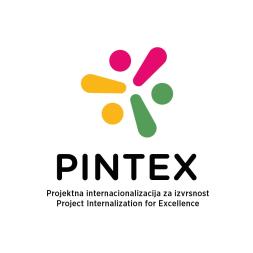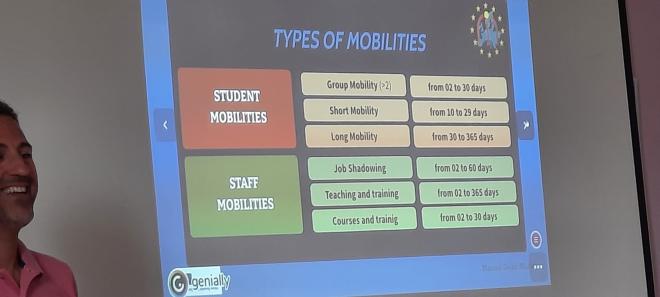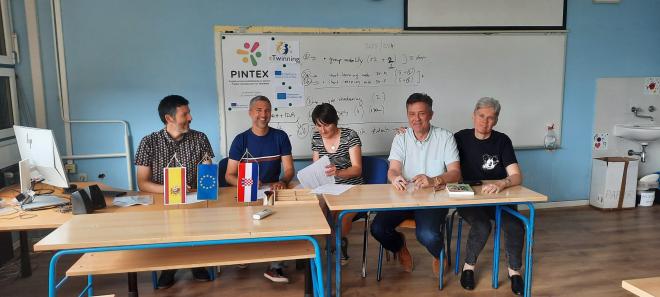Invited experts
INVITED EXPERTS IN 18. GIMNAZIJA
Invited experts: Manuel Muriel Galan and Eduardo Cas Calzado
Within the PINTEX project, in July there were three workshops held by "invited experts", our Spanish colleagues Eduardo Cas Calzado and Manuel Muriel Galan from IES Trassiera (Cordoba).
Mrs Dvoršćak and Mrs Tardelli, project coordinators, welcoming the invited experts
Our Spanish colleagues gave us information and advice how to use eTwinning for all kinds of projects. First of all, they showed us how to deal with the new eTwinning platform on ESEP.
Eduardo Cas Calzado about eTwinning
Afterwards, our Croatian teacher Jelena Glavaš introduced us to My TwinSpace, which offers the opportunity not only to communicate with colleagues and students as part of Erasmus+ (or other) projects, but also to document activities throughout the project in form of graphs, videos, surveys, etc.
Mrs Glavaš about PINTEX TwinSpace
Our Spanish colleagues also highlighted the correlation between eTwinning and Erasmus +. In doing so, they explained many advantages of eTwinning for a successful Erasmus + project, such as: pedagogical projects beyond mobilities, recognition, career opportunities, finding good partners, dissemination and good practice ideas.
Mr Gall, the principal, and Mrs Špoljar in workshop
Furthermore, our Spanish colleagues pointed out the importance of quality of eTwinning projects as part of Erasmus + and presented 5 criteria according to which their quality is evaluated: collaboration between partner schools, the use of ICT, pedagogical innovation, curricular integration and finally results and dissemination.
Work in progress
Work in progress
Since 2 projects of our Spanish colleagues won national and European awards and were invited to eTwinning conference in Madrid in November 2022, we had the priviledge of finding out about their planning, preparation, implementation, evaluation and examples of good practices, as within their project "Math and Finance".
Teachers from 18. gimnazija with invited experts
ERASMUS PROGRAM AND BENEFICIARY MODULE
Our colleague Manuel Galán Muriel gave a lecture on the Erasmus program and Erasmus Beneficiary Module.
The lecture covered four parts:
• Erasmus program platforms and tools
• Mobilities
• Funding rules
• Beneficiary Module Erasmus(BM)
Maunel Galan Muriel about possibilities of Erasmus + program
Manuel briefly introduced us to the main activities of the Erasmus+ program with an emphasis on KEY ACTION 1 – MOBILITY OF INDIVIDUALS, which is the most interesting for our school.
Important platforms for finding partners for KEY ACTION 1 – MOBILITY OF INDIVIDUALS are:
- The Erasmus Project Results Platform
- European School Education Platform (ESEP)
- eTwinning.
Although we already use these platforms, additional information and instructions are welcome especially for Beneficiary Module, which we have to use for our final report.
Beneficiary module workshop
Manuel first talked about Preparatory visits, the aim of which is to carry out all the necessary preparatory work so that the mobility of students and staff can proceed smoothly.
Types of mobilities
Furthermore, he introduced us to different types of mobilities: Mobilities for students, Mobilities for staff and Other mobilities. Mobilities for students can be group, short-term and long-termv ones. Staff mobilities can be Job Shadowing, Teaching and Courses and training. Other mobilities include Invited experts, Hosting Teachers and educators, Training.
We have experience with many of these mobilities, but long-term mobility for students is new to us.
Manuel drew our special attention to the funding rules that Erasmus Grant offers us with established rules for each budget item and explained it in detail.
Beneficiary module (BM) was presented to us through the Timeline of BM, organizational structure and deadlines, which was very useful.
Beneficiary module workshop
Through conversation and answers to questions after the lecture, we received additional information that will help us in further organization and design of projects within the Erasmus+ program.
Three days were spent in working atmosphere. At the end, principal of the school, Hermenegildo Gall and coordinators of PINTEX project, Ida Dvoršćak and Sandra Tardelli, signed the document with our invited experts Eduardo Cas Calzado and Manuel Galan Muriel to conclude this very valuable cooperation of our schools, IES Trassierra from Cordoba, Spain, and 18. gimnazija from Zagreb, Croatia.
Final signatures

















